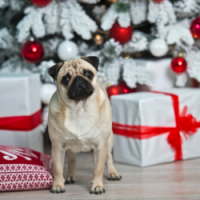Raising a puppy may take quite a bit of time and effort, but puppies also bring joy into the home. You can expect adjustments to your family’s routine. Much of your time will be spent supervising the puppy to keep him safe and to prevent him from damaging your home. You’ll need to try to prevent house soiling by making sure you are available to take your puppy outside as often as necessary, and some of these outings could be in the middle of the night. Planning ahead can help make the transition smoother.
What is the best age to bring my new puppy home?
For optimal behavioral development, puppies should remain with their mother and littermates until 7–10 weeks of age. At this age, puppies are quite flexible in their behavior and adaptable to new surroundings. This flexibility peaks at about 12–14 weeks of age. The most important thing to remember is that as soon as your puppy is settled into your home, she should be gently introduced to the elements of her new world.
What can I do to help my puppy in its social development?
Introduce your puppy to a wide variety of new people and situations. Arrange social interactions with calm children. Introduce other healthy puppies and gentle dogs and cats that are familiar with puppy antics. Bring plenty of treats along and be sure your puppy is not overwhelmed. Keep the outings short and fun. Think of the things you would like to do with your puppy when she grows into an adult dog and begin gentle exposure to these activities and situations. Perhaps your dog will need to travel to a city or ride in an elevator. Try to plan a new activity or social event at least twice every week.
Is it safe to take my puppy out in public at such a young age?
A young puppy might not be fully vaccinated yet. Therefore, it is important to avoid bringing your puppy to locations where there may be unvaccinated dogs. Be sure the dogs your puppy meets are fully vaccinated and that other puppy owners are as careful as you are. Avoid dog parks where vaccination histories are unknown.
Proper socialization is crucial for healthy behavioral development. Without adequate socialization, puppies are at risk of developing fearful behavior that could require lifelong management and could prevent your puppy from enjoying a rich social life.
At what age can I start training my new puppy?
Your new puppy is ready to start training from the moment he joins your household. He is already learning during every waking moment! Every interaction you have with your puppy from the first time you meet will be a form of training. Some puppies have even been house trained before they leave their littermates. Young puppies quickly learn to eliminate in an appropriate location, though they are not always able to hold their bladder for very long.
Similarly, it is never too early to introduce verbal cues such as sit, lie down, and come. Puppies have short attention spans, so keep the training sessions short and fun.
Try to find a puppy kindergarten near you. Most puppy classes focus on both socialization and training. Be sure the trainer uses techniques that are gentle and that you and your puppy feel safe and happy while in class.
How do puppies learn?
Puppies, like all animals, engage in behaviors that have a positive outcome. If a behavior leads to a treat, attention, or a toy, the puppy will eagerly repeat the behavior. Reward-based training relies on delivering something your puppy likes when your puppy engages in a behavior that you like. The reward must be appealing to the puppy. Find treats and toys that your puppy loves and make sure to give a reward when you notice your puppy is doing something you like.
What happens if my puppy does not listen to me?
Learning takes time. Training should begin in a quiet environment, and in that environment, your puppy may be able to follow cues and do desirable behaviors (e.g., sitting when asked, coming when called, or lying down while you eat dinner). When the environment changes, such as when there is a lot of commotion, or if the puppy is uncertain exactly what behavior you are requesting, then she may not follow your direction. She may even engage in undesirable behaviors, such as running in the opposite direction.
Be patient. Do not scold your puppy, and do not try to physically force your puppy to listen. Instead, quietly regain your puppy’s attention and think back to the steps used to teach the behavior in the first place. Be patient and consistent.
How do I prevent my puppy from doing damage or getting into mischief?
Puppies need to be supervised 100% of the time. When you are not able to supervise, your puppy should be in a safe area such as a puppy-proofed room, play yard, or crate. Provide your puppy with plenty of safe, interesting toys and rotate them so they remain exciting.
Be sure you provide plenty of social play and exercise. When you relax, keep an eye on your puppy. Use a leash or gate to be sure your puppy stays close enough that you could easily distract her if she gets something she should not have, such as a remote control. Try to catch her before she grabs something: squeak a toy or bounce a ball and then give her an appropriate, chewable item so she can be successful.
Supervision will also prevent house soiling. Be sure to take your puppy outside at least every hour if she is active, as she won’t be able to control her bladder. Prevention is easier than cleaning up a puddle. If you make a mistake and she does eliminate, do not scold her. Instead, take her outside in case she is not finished.
Should I punish my puppy for misbehavior?
Punishment is not a useful training technique, and in fact, it can have many negative consequences, including a loss of your puppy’s trust. Instead of trying to stop undesired behaviors, focus on teaching your puppy what you do want by consistently rewarding the desired behaviors. When a puppy makes a mistake, first consider whether there was a lapse in management – perhaps the puppy was accidentally left unsupervised.
If you do need to interrupt an undesirable behavior, you may use a distraction or an unexpected word such as “Hey!” – but do not frighten your puppy. You just want to get your puppy’s attention in order to interrupt a behavior and then immediately redirect the puppy to a more appropriate behavior. By showing the puppy what we want, it is easier for them to make appropriate choices in the future.
What if my puppy is very stubborn or uncooperative?
If your puppy is not following directions, try to determine the possible reason.
- Is the reward desirable enough?
- Has the reward delivery been well-timed and consistent? It can be helpful to work with a skilled trainer who understands how dogs learn and uses positive reinforcement.
- Is your puppy physically able to do the behavior? Some puppies have neurologic problems that affect their ability to learn. Even young dogs can experience pain that may impede learning.
- Is your puppy fearful? Puppies may become afraid in certain environments. Sensitive puppies may be frightened if they perceive you are not pleased with their behavior.
If you find your puppy is not listening as well as expected, seek advice from a professional behavior consultant who can assess your puppy’s behavior and design an effective training strategy. It’s okay to ask for help, and the sooner, the better for the best possible outcome.
What must I do to provide for my puppy’s needs?
Your puppy needs good nutrition, positive social interactions, mental stimulation (training), physical exercise, and plenty of sleep. Puppies benefit from an enriched environment that provides opportunities to sniff and explore.
© Copyright 2023 Lifelearn Inc. Used and/or modified with permission under license.






